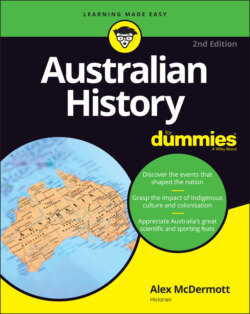Читать книгу Australian History For Dummies - Alex McDermott - Страница 82
CRIMINALS OF GREAT ENTERPRISE
ОглавлениеYoung convicts coming to the new settlement in NSW found plenty of opportunities to make good. Often illiterate, without any great training or skills — beyond a sharp eye for the main chance, which had got them into trouble in the first place — individual convicts with enough luck, initiative and sheer hustling ambition began making their way up the colonial ladder, setting up lucrative businesses even as they were still serving their sentences. Here are two good examples.
Aged 19, Simeon Lord had been sentenced to seven years transportation for theft in Manchester in 1790. He’d been lucky not to be hanged, because the jury had deliberately underestimated the worth of the goods — 100 hundred yards (91 metres) of muslin and the same amount of calico was worth far more than the 10 pence it was valued at, but juries preferred to have a person transported rather than executed for such crimes. Getting to Sydney on the Third Fleet, he was assigned as servant to Officer Thomas Rowley, who obviously spotted a lad with sharpness about him and set him up as his retail frontman. Lord proved so valuable that when he was emancipated — sooner rather than later — Rowley set him up as a licensed victualler (supplier of goods) and baker. Officers purchased large amounts of cargos of merchandise and put it all in Lord’s hands to sell on commission, both wholesale and retail. Ship captains also found him useful, especially when they found out how much profit the officers were making off the imported goods. They started to bypass the officers and sell their goods by auction. Lord was the auctioneer, took 5 per cent for selling the cargo and collecting the bills, and built a huge warehouse on the site of Macquarie Place — and began making a killing selling from there. By 1806, Lord had a house bigger and more luxurious than the Governor’s residence, had bought ships and was trading with India, China, England, New Zealand and the Cape of South Africa.
Henry Kable was an illiterate man who arrived, aged 25, with his soon-to-be wife, Susannah Holmes, on the First Fleet. Phillip made him one of the constables of the early settlement. Soon he was running the gaol and selling liquor at steep prices to the drunks and malefactors that he locked up. In 1794 he was granted 30 acres at Petersham, and in 1799 he was appointed chief constable of the colony. Demoted for illegally importing pigs in 1802, his trading went on from strength to strength. In the early 1800s he became heavily involved in the new sealing industry, turning the sealskins into leather boots and shoes in a Sydney manufactory, and exporting sealskins to first Canton and Calcutta, and then London. By 1806 he employed five convicts, held 215 acres, and owned 10 horses and numerous cattle and sheep.
